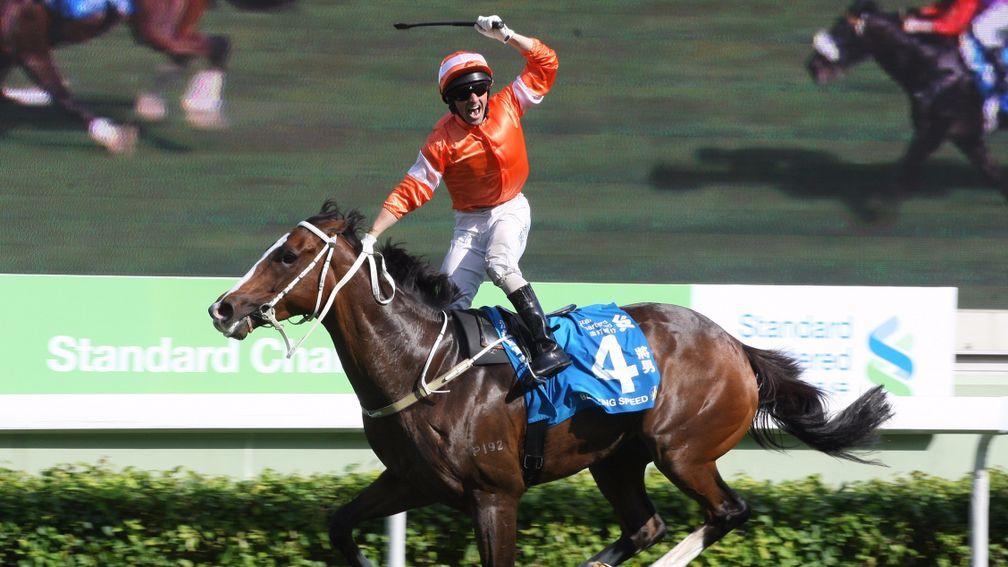'Nothing matters here like being in the right position'
Neil Callan with a jockey's guide to Hong Kong's two tracks

Jockeys can develop something of a cult status in Hong Kong.
In part because it is a racing-mad jurisdiction, with more than a billion Hong Kong dollars (about £100 million) gambled on each meeting. But largely because, with the handicap so competitive and six-way finishes far from uncommon, a jockey really can make all the difference between first and failure.
Neil Callan, fifth in last year's jockeys' championship with 40 winners and now based here full-time, is one such jockey.
But how does riding in Hong Kong differ? "You have to be good from the gates because it's all about position," he says. "The pace, the right draw, tactics, they're all important, but nothing matters here like being in the right position and the earlier you get that position the more finish you'll have."
The iconic Happy Valley track – often compared to Chester – plays host to Wednesday's International Jockeys Championship. Callan believes the course is not only unique, but varies massively depending on the track configuration.
"It's amazing how much difference there is between the A track, which has the rail at its most inside position all the way around, and the C+3," he says.
In basic terms, on the C+3 track the home straight is 23 metres longer and 11 metres narrower. But it is more complicated than that.
Callan explains: "On Wednesday it's the B track, which tends to suit horses on the speed. The A track really suits horses that can corner well and hold their position into the straight. In races that are slower and more tactical, it is actually better to be drawn away from the fence – as those on the inside find it more difficult to get a clear run.
"The further they push the rail out, the more chance you get to come from behind. On the C+3 track it can be very hard to make up ground from the back if they go slow, and being trapped wide is a nightmare because the bend is so much longer, but if there's pace on – as there usually is in Hong Kong – then you have a bit more of a chance to come from the back as it's almost physically impossible to take the bend and hold the rail in front as it throws you out into the straight.
"It fans the field and gives those coming from behind a chance up the rail – if you're in a position to do that. It's not a cutaway as such as they work the rail back all the way back to the winning post, but it rides a bit like one."
Sha Tin, he says, is different. The track is fairer and "the best horse normally wins".
That said, there are still some advantages to be gleaned in Sunday's Group 1 races. "You've got to be drawn low in the sprint as it's such a short run to the first bend and they always jump fast and race to it," he says. "It's slightly dependent on where the pace is and what's either side of you, but if the fast horses are on the inside you've got no chance of getting a good position.
"You get a much longer run to the bend in both the Mile and the Vase, so you have a lot longer to get a position. The 2,000 metres [1m2f, Hong Kong Cup] starts in the home straight and there's a short run past the winning post before the first turn, so again the draw can be crucial.
"They usually run fast for the first 300m and then the pace slackens down the back. It normally begins to get going just before the turn, so it could turn into a little bit of a sprint. But, as we saw last year, A Shin Hikari just jumped and ran and if he does that again it will be interesting as he set a hell of a gallop."
Published on inNews
Last updated
- Join Racing Post Members' Club for the very best in racing journalism - including Patrick Mullins' unmissable trip to see Gordon Elliott
- Join the same team as Ryan Moore, Harry Cobden and other top jockeys with 50% off Racing Post Members' Club
- Racing Post Members' Club: 50% off your first three months
- 'It’s really exciting we can connect Wentworth's story to Stubbs' - last chance to catch master painter's homecoming
- The jumps season is getting into full swing - and now is the perfect time to join Racing Post Members' Club with 50% off
- Join Racing Post Members' Club for the very best in racing journalism - including Patrick Mullins' unmissable trip to see Gordon Elliott
- Join the same team as Ryan Moore, Harry Cobden and other top jockeys with 50% off Racing Post Members' Club
- Racing Post Members' Club: 50% off your first three months
- 'It’s really exciting we can connect Wentworth's story to Stubbs' - last chance to catch master painter's homecoming
- The jumps season is getting into full swing - and now is the perfect time to join Racing Post Members' Club with 50% off